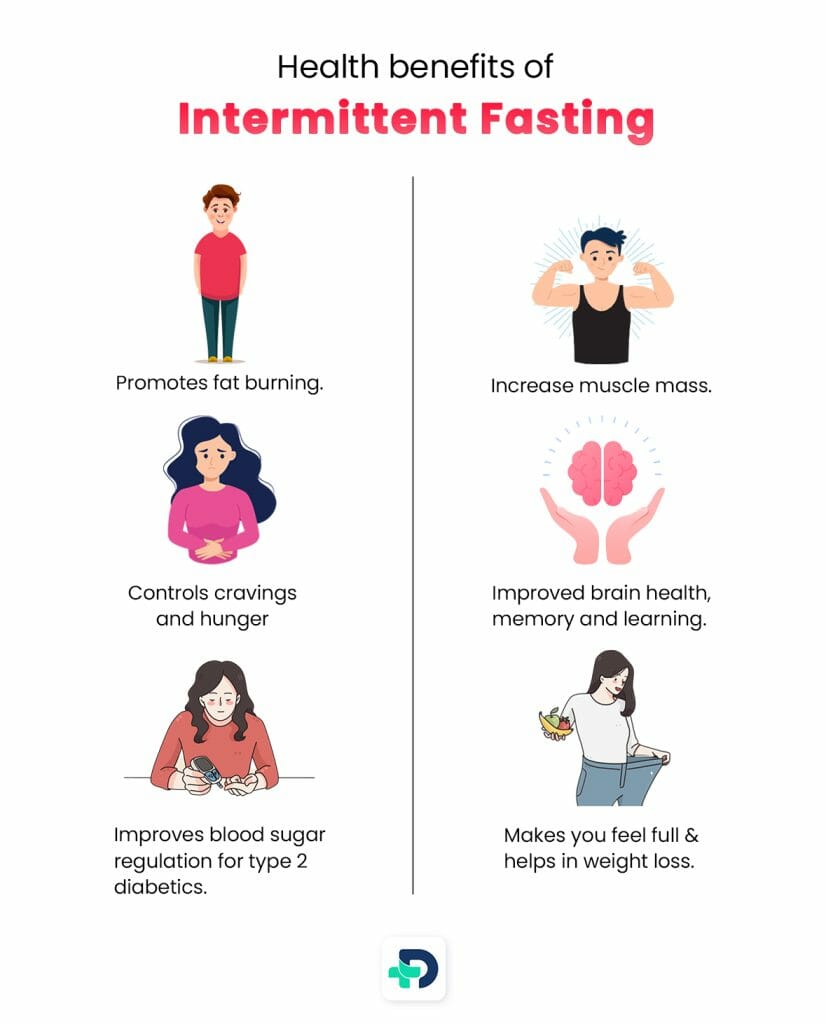Benefits of Intermittent fasting

- Intermittent Fasting
- 16 Aug 2023
Overview
What is Intermittent fasting?
Intermittent fasting has evolved as a powerful and convincing strategy for weight control and general health in a world where dieting trends come and go. It isn’t a diet in traditional terms; instead, it’s an eating schedule that alternates between eating and fasting times.
The idea of intermittent fasting, its many approaches, and its possible health advantages are all explored in this article. We will explore the underlying science to comprehend how it works.
Today, people looking for practical strategies to improve their health are embracing intermittent fasting as a popular health and wellness trend.
Understanding the concepts and applications can offer helpful insights and techniques for accomplishing your objectives, whether you want to lose weight or improve your wellness or health.1Overview| Researched based study from Nia.nih.gov

Methods
Different methods of fasting
16/8 method
- This regimen, commonly referred to as the “Lean Gains Protocol,” limits the eating window to eight hours per day and incorporates daily fasting for sixteen hours.
- This strategy often involves missing breakfast and eating all your meals within an 8-hour window, such as 12 pm and 8 pm. The fasting phase usually lasts through the night and into the following day.
5:2 diet
- This means regularly eating five days out of seven while limiting calories to 500–600 for two days.
- On days when they are fasting, many eat low-calorie meals or choose meal alternatives. Although it is still advised to keep a balanced and nutritious diet, the final five days provide emotional eating.
Alternate-day fasting
- In this, fasting days and non-fasting days are alternating. You usually consume 500–600 fewer calories daily or less when fast.
- People are not subject to special dietary restrictions on days when they are not fasting. Although this strategy offers a strict fasting approach, it could be difficult for certain people to maintain it over the long run.
Eat-stop-eat
- This technique calls for a complete 24-hour fast once or twice each week. This entails not ingesting any calories from supper on one day to dinner on the next.
- For instance, a person might have supper on Monday and then refrain from eating until Tuesday. Only water, herbal tea, and calorie-free drinks are permitted during fasting.
Warrior diet
- It requires a prolonged 20-hour fast followed by a 4-hour eating window. Small amounts of raw fruits and vegetables and meals high in protein may be ingested throughout the fasting period. The four-hour eating window is often when most of the meal is eaten.
Although these strategies offer a framework, specific tastes, and requirements may differ. Pay attention to your body’s signals and pick a sustainable approach compatible with your health objectives.6Methods| Researched based study from Nlm.nih.gov
Health benefits

Health benefits of intermittent fasting
It works through various physiological mechanisms in the body, such as:
Promotes fat burning
- Hormone levels could change significantly as a result. Insulin is one of the main hormones impacted. Insulin levels drop when fasting, facilitating more accessible access and utilization of body fat as a fuel source. This may help people lose weight while promoting fat burning.4Health benefits| Researched based study from Nlm.nih.gov
Increase muscle mass
- It also stimulates the release of human growth hormone, which is essential for developing muscles, the breakdown of fat, and overall body composition. Increased HGH levels can assist the body’s capacity to burn fat and sustain lean muscle mass.4Health benefits| Researched based study from Nlm.nih.gov
Impact on cellular repair processes
- It starts a cellular process known as autophagy, which is how the body removes damaged cells and recycles cell parts. The body enters a stage of cellular renewal and repair when fasting. This eliminates misbehaving organelles and proteins, improving cellular function and lowering the risk of age-related illnesses.9Health benefits| Researched based study from Nlm.nih.gov
Improved brain health, memory and learning
- By eliminating accumulated waste products and promoting the development of new neurons, autophagy also contributes to improving brain health. This might result in better mental and cognitive wellness.9Health benefits| Researched based study from Nlm.nih.gov
- Positive benefits on cognitive performance and brain health. It promotes the synthesis of brain-derived neurotrophic factor (BDNF), a protein that aids in the development and defense of neurons.6Health benefits| Researched based study from Nlm.nih.gov
Improves blood sugar regulation for type 2 diabetics
- It can increase insulin sensitivity, essential for keeping blood sugar levels steady and avoiding insulin resistance. Your body uses insulin more effectively while you fast, which helps you maintain appropriate blood sugar control. Those who have type 2 diabetes may benefit the most from this.6Health benefits| Researched based study from Nlm.nih.gov
Controls cravings and hunger
- It could also help control hunger and lessen cravings for high-calorie, sugary meals, making it simpler to reach weight goals.6Health benefits| Researched based study from Nlm.nih.gov
Makes you feel full and helps in weight loss
- It could work well as a weight-loss tool. It may increase metabolism and fat burning while maintaining muscle mass by lowering total calorie intake and improving weight reduction outcomes.
- Additionally, the hormones that control appetite could reduce the desire to overeat. The hormone leptin, which alerts us when we are full, may become more sensitive, encouraging satiety and limiting calorie intake.2Mechanism| Researched based study from Nlm.nih.gov .It can be an effective strategy for reducing weight and enhancing body composition.
Lowers inflammation and may also prevent chronic conditions.
- It may aid in preventing chronic illnesses, including cardiovascular disease, type 2 diabetes, and some forms of cancer, by lowering inflammation and oxidative stress in the body.8Health benefits| Researched based study from Nlm.nih.gov
Increases your lifespan
- It could promote lifespan. It demonstrates a proposed plan of action to encourage good aging and increase longevity.1Health benefits| Researched based study from Nia.nih.gov
Precautions
Safety Considerations and Precautions
It can be safe and helpful for many people, but it might only be appropriate for some. Here are some crucial factors to remember:
Who should avoid intermittent fasting?
People with eating disorders
- People with a history of developing or worsening eating disorders might have disordered eating practices. Prioritizing a positive connection with food is crucial.
Ladies who are pregnant or nursing
- For the health of the mother and the unborn child, appropriate nutritional intake is necessary throughout pregnancy and nursing. It’s crucial to prioritize a well-balanced meal over intermittent fasting since these times may not be sufficiently nourished by intermittent fasting.
People with some medical conditions
- Intermittent fasting might not be appropriate for some medical problems, such as diabetes, low blood sugar, or medications that require regular dietary consumption. You must visit a doctor to find out if it is safe.6Precautions| Researched based study from Nlm.nih.gov
Adverse effects
Possible adverse effects and strategies for managing them
Cravings and hunger
- It’s typical to feel hungry and have desires when fasting. You can control this by drinking calorie-free beverages, staying hydrated, and engaging in activities.
Low energy
- Some people could feel tired or low on energy for a short while, especially during the first few days of adjustment. Ensuring enough water intake, obtaining enough sleep, and easing into fasting gradually.
Irritability and mood changes
- Some people’s moods may be affected by it. Manage mood swings by engaging in stress-relieving activities, eating a balanced diet while eating, prioritizing self-care, and keeping a balanced diet during eating times.5Adverse effects| Researched based study from Nlm.nih.gov
Taking into account individual requirements
- Fasting is adaptable, and changes may be made to accommodate personal tastes and needs. Some things to think about are:
Duration of fast
- You may change the length to suit your tastes and way of life. You can apply shorter or longer fasting windows depending on what works best for you.
Eating window
- To ensure you eat enough nutrients and satisfy your needs, you can change the timing and size of your eating window.
Frequency
- Additionally, the fasting schedule may be changed. Depending on your objectives and comfort level, you could practice every day or a few times each week.7Adverse effects| Researched based study from Nlm.nih.gov
Tips
Tips and strategies for successful fasting
Plan your meals ahead of time
- To ensure you always have nutritious alternatives accessible, prepare your meals and snacks in advance.
Make nutrient density optimal.
- During your mealtimes, pay attention to eating meals high in nutrients. Make sure you eat a lot of fruits and veggies.
Keep hydrated.
- Drink a lot of water all day long. Black coffee, herbal tea, and other light drinks are also options.
Adjust your fasting schedule gradually.
- If you find adjusting to a lengthier fasting period difficult, lengthen it gradually over time.8Tips| Researched based study from Nlm.nih.gov
Exercise
- Schedule exercises during or right before your meal window for optimum performance and recovery.
Tracking
- Evaluate your energy levels, mood, and any changes in body composition or other health indicators regularly. You can track your development and maintain consistency by doing this.
Flexibility
- Be adaptable and change your fasting schedule or methods per your needs and preferences.8Tips| Researched based study from Nlm.nih.gov
Takeaway
Takeaway
Due to its advantages, intermittent fasting has become a popular nutritional strategy. However, for best outcomes, having a healthy relationship with food is crucial, which should be supported by a balanced diet.
It might only be suitable for some. Remember that health has many facets and that no dietary strategy is effective for everyone. Fasting is a tool you can use, but it’s only one element of the jigsaw. Make wise decisions, pay attention to your body, and prioritize your health first.
Any feedback on this article?
 This Articles content was accurate
This Articles content was accurate Very Informative Article
Very Informative Article I have a question or a comment
I have a question or a comment
 This article contains inaccurate content
This article contains inaccurate content This article was not helpful
This article was not helpful I have a question or a comment
I have a question or a comment
We appreciate your helpful feedback!
Checkout our social pages
References
-
National Institute on Aging
Research on intermittent fasting shows health benefits | Health Benefits | Overview
-
National Library of Medicine
Intermittent fasting and weight loss | Benefits | Health benefits
-
National Library of Medicine
Intermittent fasting: eating by the clock for health and exercise performance | Health Benefits
-
National Library of Medicine
Intermittent Fasting: The Choice for a Healthier Lifestyle | Health Benefits
-
National Library of Medicine
Intermittent Fasting: Benefits, Side Effects, Quality of Life, and Knowledge of the Saudi Population | Side effects
-
National Library of Medicine
Clinical Management of Intermittent Fasting in Patients with Diabetes Mellitus | Methods | Precautions | Health benefits
-
National Library of Medicine
Physiology, Fasting | Precautions
-
National Library of Medicine
INTERMITTENT FASTING AND HUMAN METABOLIC HEALTH | Health Benefits | Tips
-
National Library of Medicine
Intermittent Fasting: Current Evidence in Clinical Practice | Health benefits






































